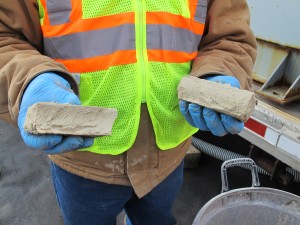Study: Radioactive gas drilling waste not a threat to public health
-
Susan Phillips

Susan Phillips / StateImpact Pennsylvania
A worker holds a brick of solid waste from gas drilling operations.
A Pennsylvania Department of Environmental Protection study looking at radiation exposure from oil and gas development says there is “little potential for harm to workers or the public.”
DEP released the peer-reviewed report Thursday, which Governor Corbett initiated in January 2013. DEP hired PermaFix, an Atlanta-based company that specializes in nuclear and industrial waste disposal, to conduct the research. The study looked at the radioactivity levels in waste resulting from gas drilling, including fracking wastewater, drill cuttings and waste solids. It also measured radioactivity through the waste transport, storage and disposal process. A DEP official says the study is the most thorough to date:
“The study report is the culmination of a multi-year effort and represents what we believe to be the most comprehensive radiological study of the oil and gas industry ever conducted,” Vince Brisini, DEP Deputy Secretary for Waste, Air, Radiation and Remediation said in a press release. “While the recommendations for future actions contained in the report call for additional studies and efforts, we now have data to inform the management of natural gas resources and resultant wastes for environmental and health protection.”
Attempts to reach Brisini, or any of the authors of the study directly, were unsuccessful. The DEP press office did not return calls or email.
Marcellus Shale, like other rich fossil fuel deposits, can contain naturally occurring radioactive material (NORM). This radioactive material, including uranium (U-238), thorium (Th-232), potassium (K-40), and radon can be brought to the surface through oil and gas production and released.
Scientists and regulators are still debating the impacts of contact with small levels of radiation. But the report concludes that oil and gas production poses little potential for exposure to radon, a dangerous gas that can cause lung cancer. Radon is found in almost all rocks and soil, and it forms from the decay of radium. The study also concludes that workers are not at risk. The study does warn, however, that waste water spills could be dangerous:
Radium should be added to the Pennsylvania spill protocol to ensure cleanups are adequately characterized. There are also site-specific circumstances and situations where the use of personal protective equipment by workers or other controls should be evaluated.
The report also recommends review of protocols for the disposal of “filter cakes,” the dry material left over from waste water recycling. And it says further study of waste treatment facilities and the use of oil and gas wastewater to combat dusty roads is needed.
















